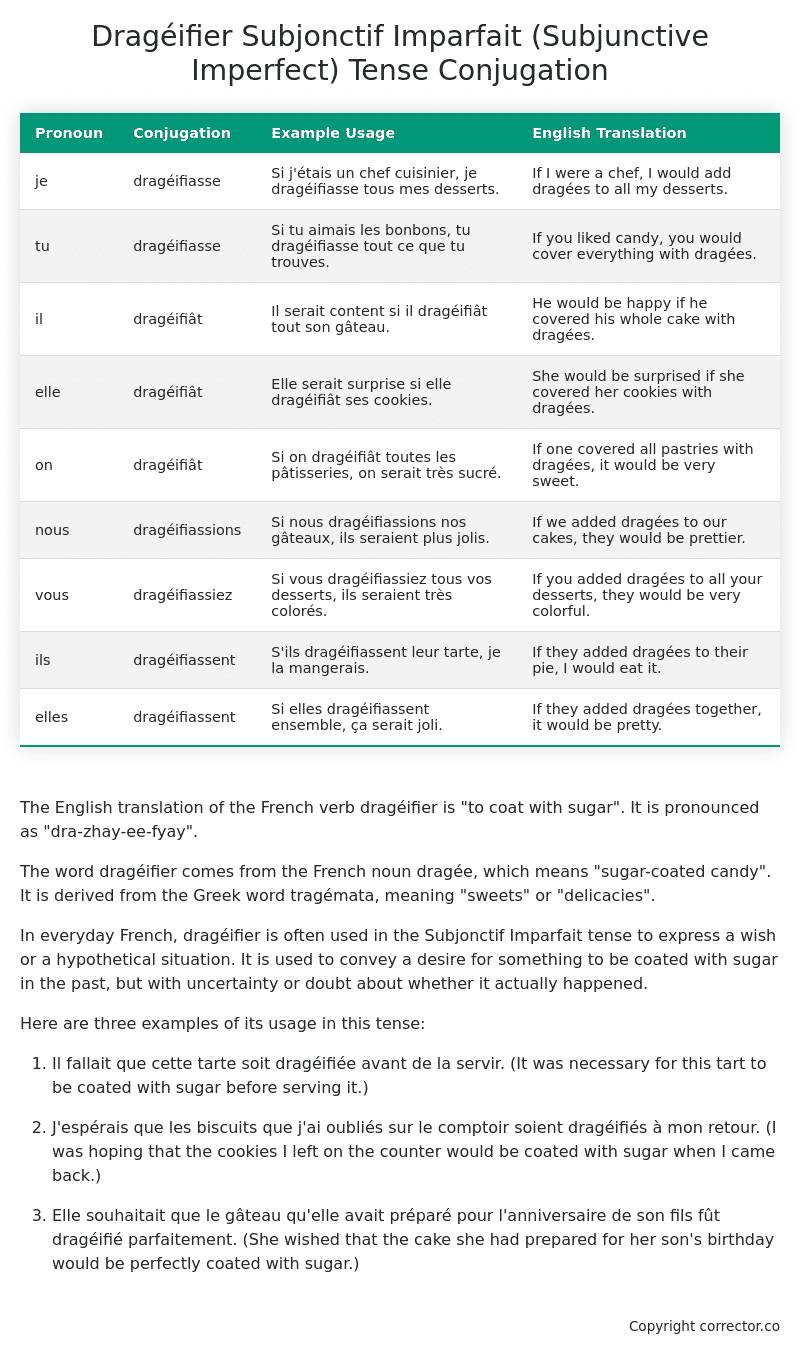Subjonctif Imparfait (Subjunctive Imperfect) Tense Conjugation of the French Verb dragéifier
Introduction to the verb dragéifier
The English translation of the French verb dragéifier is “to coat with sugar”. It is pronounced as “dra-zhay-ee-fyay”.
The word dragéifier comes from the French noun dragée, which means “sugar-coated candy”. It is derived from the Greek word tragémata, meaning “sweets” or “delicacies”.
In everyday French, dragéifier is often used in the Subjonctif Imparfait tense to express a wish or a hypothetical situation. It is used to convey a desire for something to be coated with sugar in the past, but with uncertainty or doubt about whether it actually happened.
Here are three examples of its usage in this tense:
-
Il fallait que cette tarte soit dragéifiée avant de la servir. (It was necessary for this tart to be coated with sugar before serving it.)
-
J’espérais que les biscuits que j’ai oubliés sur le comptoir soient dragéifiés à mon retour. (I was hoping that the cookies I left on the counter would be coated with sugar when I came back.)
-
Elle souhaitait que le gâteau qu’elle avait préparé pour l’anniversaire de son fils fût dragéifié parfaitement. (She wished that the cake she had prepared for her son’s birthday would be perfectly coated with sugar.)
Table of the Subjonctif Imparfait (Subjunctive Imperfect) Tense Conjugation of dragéifier
| Pronoun | Conjugation | Example Usage | English Translation |
|---|---|---|---|
| je | dragéifiasse | Si j’étais un chef cuisinier, je dragéifiasse tous mes desserts. | If I were a chef, I would add dragées to all my desserts. |
| tu | dragéifiasse | Si tu aimais les bonbons, tu dragéifiasse tout ce que tu trouves. | If you liked candy, you would cover everything with dragées. |
| il | dragéifiât | Il serait content si il dragéifiât tout son gâteau. | He would be happy if he covered his whole cake with dragées. |
| elle | dragéifiât | Elle serait surprise si elle dragéifiât ses cookies. | She would be surprised if she covered her cookies with dragées. |
| on | dragéifiât | Si on dragéifiât toutes les pâtisseries, on serait très sucré. | If one covered all pastries with dragées, it would be very sweet. |
| nous | dragéifiassions | Si nous dragéifiassions nos gâteaux, ils seraient plus jolis. | If we added dragées to our cakes, they would be prettier. |
| vous | dragéifiassiez | Si vous dragéifiassiez tous vos desserts, ils seraient très colorés. | If you added dragées to all your desserts, they would be very colorful. |
| ils | dragéifiassent | S’ils dragéifiassent leur tarte, je la mangerais. | If they added dragées to their pie, I would eat it. |
| elles | dragéifiassent | Si elles dragéifiassent ensemble, ça serait joli. | If they added dragées together, it would be pretty. |
Other Conjugations for Dragéifier.
Le Present (Present Tense) Conjugation of the French Verb dragéifier
Imparfait (Imperfect) Tense Conjugation of the French Verb dragéifier
Passé Simple (Simple Past) Tense Conjugation of the French Verb dragéifier
Passé Composé (Present Perfect) Tense Conjugation of the French Verb dragéifier
Futur Simple (Simple Future) Tense Conjugation of the French Verb dragéifier
Futur Proche (Near Future) Tense Conjugation of the French Verb dragéifier
Plus-que-parfait (Pluperfect) Tense Conjugation of the French Verb dragéifier
Passé Antérieur (Past Anterior) Tense Conjugation of the French Verb dragéifier
Futur Antérieur (Future Anterior) Tense Conjugation of the French Verb dragéifier
Subjonctif Présent (Subjunctive Present) Tense Conjugation of the French Verb dragéifier
Subjonctif Passé (Subjunctive Past) Tense Conjugation of the French Verb dragéifier
Subjonctif Imparfait (Subjunctive Imperfect) Tense Conjugation of the French Verb dragéifier (this article)
Subjonctif Plus-que-parfait (Subjunctive Pluperfect) Tense Conjugation of the French Verb dragéifier
Conditionnel Présent (Conditional Present) Tense Conjugation of the French Verb dragéifier
Conditionnel Passé (Conditional Past) Tense Conjugation of the French Verb dragéifier
L’impératif Présent (Imperative Present) Tense Conjugation of the French Verb dragéifier
L’infinitif Présent (Infinitive Present) Tense Conjugation of the French Verb dragéifier
Struggling with French verbs or the language in general? Why not use our free French Grammar Checker – no registration required!
Get a FREE Download Study Sheet of this Conjugation 🔥
Simply right click the image below, click “save image” and get your free reference for the dragéifier Subjonctif Imparfait tense conjugation!

Dragéifier – About the French Subjonctif Imparfait (Subjunctive Imperfect) Tense
Formation
Common Everyday Usage Patterns
Interactions with Other Tenses
Subjonctif Présent
Indicatif Passé Composé
Conditional
Conditional Perfect
Summary
I hope you enjoyed this article on the verb dragéifier. Still in a learning mood? Check out another TOTALLY random French verb conjugation!


